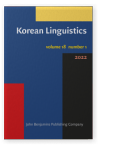Vol. 18:1 (2022) ► pp.48–75
Discourse functions of Korean ‘yes’ words
This study examines discourse functions of Korean ‘yes’ words from an interactional perspective based on naturally-occurring conversation data. Tokens of yey, ney, ey, ung, um, and e in Korean are widely recognized as affirmative responses. A close examination of these tokens, however, reveals wide-ranging interactional functions through which speakers express active engagement, share information, negotiate meaning, and maintain discourse coherence. The present study identifies a total of fifteen discourse-pragmatic functions of Korean ‘yes’ words: (1) affirmative answer, (2) confirmation, (3) acceptance, (4) agreement, (5) answer to summons, (6) acknowledgement, (7) change-of-state, (8) change-of-activity, (9) response solicitation, (10) reinforcement, (11) other initiation of repair, (12) closing of phone call, (13) continuer, (14) proposal to discontinue the on-going action for the sake of a larger course of action, and (15) arguably hesitation marker. This study demonstrates that the interactional approach enables the discovery of varied discourse functions of a type of linguistic items, which may not be readily available in dictionaries or grammar reference guides.
Article outline
- 1.Introduction
- 3.The data
- 4.Discourse functions of Korean ‘yes’ tokens
- 4.1Affirmative answer to a ‘yes/no’ question
- 4.2Confirmation
- 4.3Acceptance of offer, suggestion, or request
- 4.4Agreement
- 4.5Answer to a summons
- 4.6Acknowledgement
- 4.7Change-of-state
- 4.8Change-of-activity
- 4.9Response solicitation
- 4.10Reinforcement
- 4.11Other-initiation of repair
- 4.12Closing of phone call
- 4.13Continuer
- 4.14Proposal to discontinue the on-going action for the sake of a larger course of action
- 4.15Hesitation marker
- 5.Discussion
- 6.Closing remarks
- Acknowledgment
- Notes
- Abbreviations used in the interlinear gloss
-
References
For any use beyond this license, please contact the publisher at [email protected].
